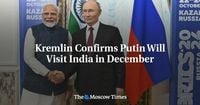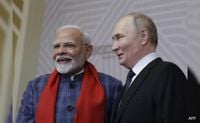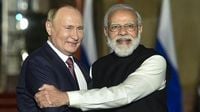Russian President Vladimir Putin is set to make a highly anticipated official visit to India in December 2025, marking a significant moment in the evolving relationship between Moscow and New Delhi. The Kremlin confirmed the visit on August 29, 2025, with Putin’s foreign affairs adviser, Yuri Ushakov, detailing the president’s packed diplomatic schedule and the broader geopolitical context shaping the trip.
Putin’s December journey will be discussed with Indian Prime Minister Narendra Modi on Monday, September 1, 2025, during the annual summit of the Shanghai Cooperation Organization (SCO) in Tianjin, China. According to The Moscow Times and AFP, Ushakov told reporters, "The two leaders would discuss preparation for the December visit." This meeting will be their first face-to-face encounter of the year, although they have maintained regular contact by telephone, as noted by multiple sources including Yahoo News and NDTV.
The backdrop to Putin’s planned visit is anything but ordinary. India is currently facing steep economic pressure from the United States, with President Donald Trump imposing a 25% additional tariff on Indian goods, effective August 27, 2025, as a penalty for New Delhi’s continued large-scale purchases of Russian oil. As reported by AFP and The Moscow Times, the total tariff on most Indian goods exported to the U.S. now stands at a staggering 50%, including a previous 25% hike announced in late July. This move is part of a broader effort by Western allies to reduce Russia’s export earnings and pressure Moscow to end its invasion of Ukraine, which began in February 2022.
Despite these Western sanctions and the U.S. tariffs, Russia has managed to redirect much of its energy exports away from Europe to major buyers like India and China, ensuring a steady flow of billions of dollars in revenue. Energy exports remain a critical source of funding for the Russian government, and India has become even more important as a trading partner since the outbreak of the war in Ukraine. According to NDTV, India has argued that it increased oil imports from Russia only because traditional supplies were diverted to Europe after the conflict erupted.
India’s Ambassador to Russia, Vinay Kumar, made New Delhi’s position clear in a recent interview with TASS, as cited by ANI and Yahoo News. "First of all, we have clearly stated that our objective is energy security of 1.4 billion people of India and India's cooperation with Russia as of several other countries has helped to bring about stability in the oil market, global oil market. So the US decision is unfair, unreasonable and unjustified. Now government will continue taking measures which will protect the national interest of the country," Kumar said. He added, "And the trade takes place on commercial basis. So if the basis of commercial transaction trade imports are right, Indian companies will continue buying from wherever they get the best deal. So that's what the current situation is."
Kumar emphasized that India’s trade with Russia is driven by shared interests and market dynamics, not politics. He also pointed out that other countries, including the U.S. and several European nations, continue to maintain trade relations with Russia despite the ongoing conflict in Ukraine. As he put it, "Our trade is based on market factors and done with the overall object of ensuring the energy security of 1.4 billion people of India. There are other countries, including the US itself and in Europe, trading with Russia."
Putin’s diplomatic itinerary for the SCO summit in China is notably busy. According to The Moscow Times and Yahoo News, the Russian president will hold extensive talks with Chinese leader Xi Jinping in Beijing and attend a massive military parade commemorating the 80th anniversary of the end of World War II. In addition to meeting Modi, Putin is scheduled for bilateral meetings with Turkish President Recep Tayyip Erdogan, Iranian President Masoud Pezeshkian, and possibly North Korean leader Kim Jong Un, as confirmed by Ushakov. These meetings are part of a four-day visit to China running from August 31 to September 3, 2025.
The Modi-Putin meeting in China is particularly significant given the complications in their partnership since Russia’s deepening ties with China amid international isolation. India and Russia have long enjoyed strong historical ties, especially in the realms of defense and energy. During the Cold War, the Soviet Union was a key ally of India, and today, Russia remains one of India’s top arms suppliers. Modi himself traveled to Russia twice in 2024—first to Moscow in July for talks with Putin, and then to Kazan in October for the BRICS summit, as reported by Yahoo News and The Moscow Times.
Yet, the relationship is not without its challenges. The war in Ukraine has complicated matters, with New Delhi walking a diplomatic tightrope. While India has avoided directly condemning Russia’s actions, it has consistently called for a peaceful settlement to the conflict. According to Yahoo News, Modi has emphasized India’s commitment to peace while maintaining the nation’s strategic autonomy.
One unique aspect of Putin’s upcoming visit is the legal context surrounding his international travel. Since the International Criminal Court (ICC) issued a warrant for his arrest in March 2023 over alleged war crimes in Ukraine, Putin has drastically reduced his foreign trips. However, India is not a party to the ICC and, as NDTV and The Moscow Times both point out, is under no legal obligation to detain the Russian leader. This fact removes a significant barrier to Putin’s December visit and underscores the enduring nature of the Indo-Russian partnership despite international legal and political pressures.
Russia’s ability to adapt to Western sanctions by pivoting its energy exports to India and China has not gone unnoticed. As The Moscow Times reports, the redirection of oil and gas flows has helped Moscow maintain a multi-billion-dollar revenue stream, even as its traditional European markets have shrunk. For India, the relationship offers energy security and access to military hardware—both vital for a nation of 1.4 billion people with growing economic and security needs.
As the world watches, the December summit between Putin and Modi is poised to be more than just a diplomatic formality. It will serve as a litmus test for the resilience of the Indo-Russian relationship amid shifting global alliances, economic sanctions, and the ongoing war in Ukraine. With both leaders navigating complex domestic and international landscapes, the outcomes of their discussions could have far-reaching implications—not just for their own countries, but for the broader balance of power in Eurasia and beyond.
In a year marked by global uncertainty, the upcoming Putin visit to India stands out as a moment of strategic calculation, economic necessity, and diplomatic symbolism for both Moscow and New Delhi.



